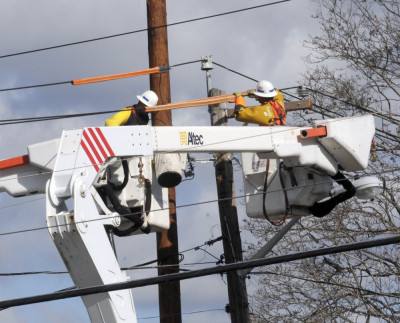
Opinion
State must fix utilities
Sunday, February 26, 2012

A National Grid crew works high above Baker’s Corner in Seekonk.
Despite some rumblings in a couple of selectmen's meeting rooms, chances are dimmer than a 10-watt incandescent light bulb that any communities in Sun Chronicle country would rush to set up new municipal electric departments even if the Legislature adopts a bill that could enable them to do so.
The bill in question would enable cities and towns to purchase local wires and transmission systems and give the state utilities commission authority to set the price. Even with state oversight, the costs would be astronomically higher than they were when the two existing local municipal systems, Mansfield and North Attleboro, were established more than a century ago. Any new municipal system would go into the starting gate saddled with debt, while the town governments creating them would lose the tax revenue currently being received from National Grid or, in the town of Norfolk's case, NStar.
Such obstacles might be surmounted with fine-tuned financing plans and payments from the new utilities in lieu of taxes, but would require risk-taking to a degree seldom seen in this corner of the state - and for good reason: when representing the public's interest, it's wiser to wait for a good price than to be the first kid on the block to buy into the newest fad.
But we have supported passage of the bill in this space, and following "Insult to injury," our front page story of last Sunday by the New England Center for Investigative Reporting, we would underline that support. Competition is the surest remedy for the major problems cited in that report and the threat of competition from municipal startups ought to be brought into the equation.
Moreover, earlier commentary has been based on acceptance of monopoly utilities that they were outperformed by municipals because of geographical factors. That is not quite the case. NECIR points out that municipals employ four or more service workers per 10,000 residents, while the monopolies employ three. And despite their obviously higher personnel costs, municipal systems tend to have lower rates. Philosophical questions about the virtue of monopolistic shareholder-owned utilities vs. public-owned municipals ought also be balanced by considerations of public safety. The number of major blackouts is on the rise, as is the time needed on average to put the lights back on. Without pressure from the Statehouse, we see little likelihood of the major electric suppliers changing their practice of holding personnel costs down, deferring tree-trimming and other maintenance, then calling in the troops from outside the region to help with the blackout recovery.
History tells us that events like Tropical Storm Irene and the freak pre-Halloween snow storm will come again. The length of the wait for power return, while hospitals utilize emergency generators and meat spoils in residential freezers, could be shortened with pressure from the state.
Sen. James Timilty, D-Walpole, has spoken strongly in favor of the municipal electric bill. State representatives Betty Poirier, R-North Attleboro, and Jay Barrows, R-Mansfield, could give meaningful support to the bill. Both are outspoken champions of the free enterprise system. Both also live in communities served by municipal electric systems. They are in ideal positions to help bridge any philosophical divide regarding the bill.
We also strongly support state Rep. Dan Winslow's to give the utilities a financial incentive to step up storm preparations and emergency response by making them give customers a rebate when there are lengthy outages. For blackouts lasting more than eight hours, the rebate would equal two days' average energy cost for every day without power.
The alarm on power blackouts was sounded loudly by Irene and the October snows. Beacon Hill must wake up and respond to it with votes in favor of competition in electricity distribution and by imposing penalties for dim service.
